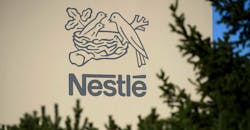Nestle Pushes Into US Faux Meat Crowd to Catch Up With Beyond
Nestle SA started shipping a new plant-based burger to supermarkets throughout the U.S. as the world’s largest food company seeks to catch up with the growth of upstarts Beyond Meat Inc. and Impossible Foods Inc.
Sweet Earth Awesome Burgers, made of pea protein and coconut oil, will cost about $5.99 for two 4-ounce patties, the same price as the Beyond Burger. They will be available in supermarkets including Stop & Shop, Safeway and Wegmans.
Nestle faces a crowded market, with Beyond Meat captivating investors after the shares more than quintupled following an initial public offering in May. Nestle Chief Executive Officer Mark Schneider served investors a vegan dinner at his first strategy day in 2017, where he spoke about how he would try to jump-start the company. Two years later, the food giant is finding it wants to tap into the faux-meat craze that its nimbler rivals have helped unleash.
As consumers cut down on their meat intake, be it for health reasons or concern over greenhouse emissions, food companies including Nestle and Kellogg Co. are trying to fill the void. With established distribution networks and bigger marketing and research budgets, they’re seeking to close the gap with nimbler upstarts that have high brand recognition but sometimes struggle with production constraints.
Nestle has so far focused on the meat-alternative market in Europe, where it sells Garden Gourmet vegetarian products. It’s making its debut in the U.S. after Beyond has made a whole line of imitation beef and sausage products available in grocery stores nationwide. Burger King and White Castle offer Impossible Burger products, which also went on sale for the first time in U.S. supermarkets this month with a debut in southern California. Kellogg Co.’s Incogmeato Burger will hit stores early next year.
‘Late to the Party’
“Nestle was late to the party and will have to work a bit harder than the established brands, but it’s not a missed opportunity,” said Robert Waldschmidt, an analyst at Liberum. “Nestle touches an enormous number of retail and wholesale food-service customers. They don’t have to do as much door-knocking as others, they can just bring their product in as they go along.”
In Europe, Nestle has had mixed success after a product launch earlier this year. One big win was securing a deal with McDonald’s Corp. in Germany, though that’s still the extent of Nestle’s presence in fast-food fake meat. Four months after the European introduction of its meatless burger, the company revamped its recipe to make it juicier and give more of a grilled-beef flavor.
Nestle’s biggest setback came in the U.K., where the company pulled a line of Garden Gourmet products after a test run at Sainsbury’s supermarkets earlier this year. The U.K. is one of the most competitive markets, with the highest number of vegan product launches last year, according to Mintel. Nestle has said it plans to return to the U.K. at a later date.
The Swiss company’s plant-based business may reach more than 1 billion francs ($1 billion) in sales within a decade, Laurent Freixe, chief executive officer of the Americas region, said last year. Sales of plant-based products in Europe are in the hundreds of millions of francs, Nestle Chief Financial Officer Francois-Xavier Roger told investors at a presentation Wednesday.
If Nestle can expand its deal with McDonald’s to the U.S., it could snatch a leading position in plant-based burgers, said Jean-Philippe Bertschy, an analyst at Bank Vontobel AG.
“Without a fast-food deal, it will likely take them a bit longer,” he said.
About the Author
Bloomberg
Licensed content from Bloomberg, copyright 2016.
